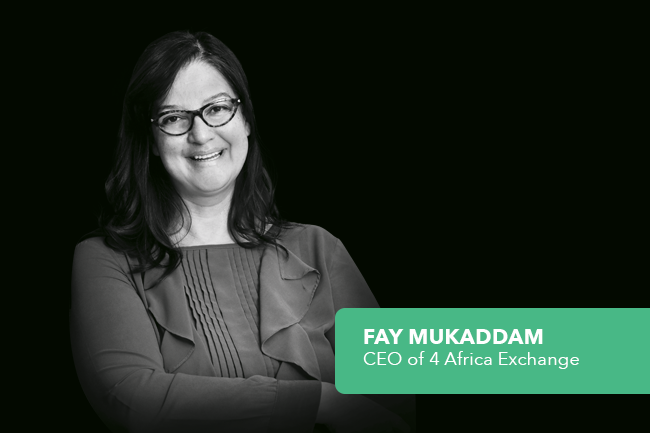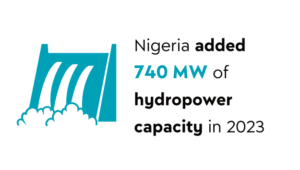In holding a licence to trade since 2016, across a range of asset classes, including equities, debt, special-purpose vehicles and real estate investment trusts, 4 Africa Exchange (4AX) was able to open its medium-sized market cap exchange in the third quarter of last year, with two issuer listings. It has since grown that to five, and the exchange currently has commitments of nine to come.
4AX is being touted as Africa’s Nasdaq and enters with the promise of making financial markets more inclusive by providing a safe and licensed platform that provides easier access, and more product variety.
CEO Fay Mukaddam explains that, in using the word ‘more’ in its promise, 4AX is presenting an alternative investment option in terms of accessing financial and capital markets – other, that is, than the Johannesburg Stock Exchange (JSE).
‘Market competition in local capital markets is important and – in keeping with growing economies around the world – fair competition not only benefits the consumer from a cost perspective but also stimulates innovation, new product development and services new target markets. Collectively these aspects will benefit the South African capital markets as a whole,’ she says.
4AX plans to facilitate this by earning the market’s confidence, according to Mukaddam. ‘We want to show the market what we are capable of achieving with our diverse offering. Our objective is to bring institutional, private and retail investors, [and] people in the communities together in a digital, disruptive and economically transformative space. In this way we can act as a vehicle for real and meaningful change.’
Although investors are required to trade through an authorised user, the packaging of regulated investor protections, simplified solutions, transparent fee structures and the free public sharing of information are designed to demystify, broaden and deepen the local capital investment environment, and thus create more financial inclusion and prosperity for all. This encompasses, uniquely, the second economy, which is often referred to as the township economy.
‘In a strategic partnership with the Gauteng provincial government, we are encouraging and supporting the participation in formal capital markets by entrepreneurial businesses from township areas, and by listing those on the exchange,’ says Mukaddam.
‘Most Africans are already exposed to stock exchanges in one way or another, be that through their pension fund, unit trust or other similar investment products. The difference is that with our model they have affordable access to benefit from stock exchange trade, which in turn creates more opportunities for spending and churn in key markets. The broader economy is impacted as a result.’
The over-the-counter (OTC) market segment has presented ‘extraordinary opportunities’ for 4AX, says Mukaddam, but debt listing also has huge potential. ‘Earlier this year, we acquired RainFin’s corporate debt marketplace, which enabled us to expand our products. In launching our new debt listing offering in the third quarter this year, we will be in a position to deepen South Africa’s sophisticated debt capital market and expand on the similarly growing sophistication of Africa’s debt and loan markets,’ she says.
Mukaddam believes there is a strong appetite for alternative listing and trading options across the continent, hence the reason 4AX is targeting new ventures, structured products, restricted and OTC schemes. ‘There is much elasticity in the market and economy to absorb these.’
Even if this means additional competition as more applicants apply for and are awarded licences to trade?
‘Our unique differentiators in the mid-market sector include acquisitions and growth through listed shares as acquisition currency, by reducing associated red tape and costs, and increasing speed to market and ability to execute.
‘We promote shareholders’ democracy by allowing [them] to set certain key clear listing requirement thresholds, which we regulate. New issuers, with less than a three-year trading history, can be listed. We also allow for the listing of qualifying N-Shares – that is, those with a voting share model – to promote listings,’ she says.
‘The promotion of listing BEE schemes and investment holding companies, and reduced spread requirements if a listing serves a sound business objective and model, are other similar differentiators.’
4AX is using technology extensively and sees this as a competitive advantage. ‘Smart technology can be customised to meet the needs of targeted 4AX issuers and investors. Its modern scalable design and infrastructure reduce cost and increase efficiencies,’ says Mukaddam.
‘We are also the only exchange in South Africa, and one of a handful globally, to have purchased the technology for our exchange platform.’
In that vein, 4AX closely monitors market developments and trends in fintech and, in particular, cryptocurrencies. ‘We have begun an initial investigative process to understand how cryptocurrencies work and what listing one on our exchange would require, including assessing our current paradigm, be that exchange rules and listing requirements to current regulatory and legislative frameworks, and trending patterns,’ according to Mukaddam.
‘We seriously consider and investigate every opportunity to offer value to issuers, investors and our shareholders, to ensure that we maintain offerings in a safe and well-regulated environment.’

















